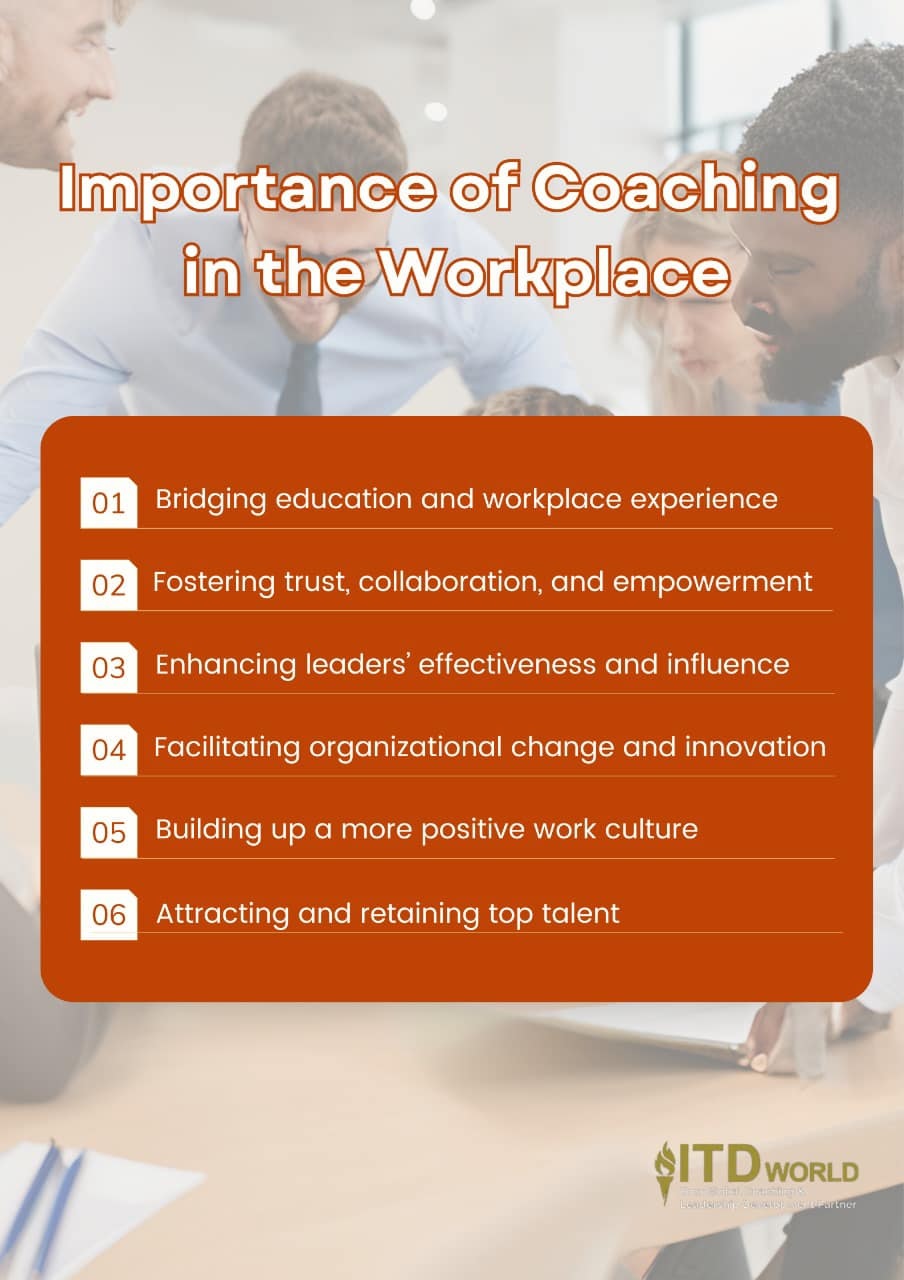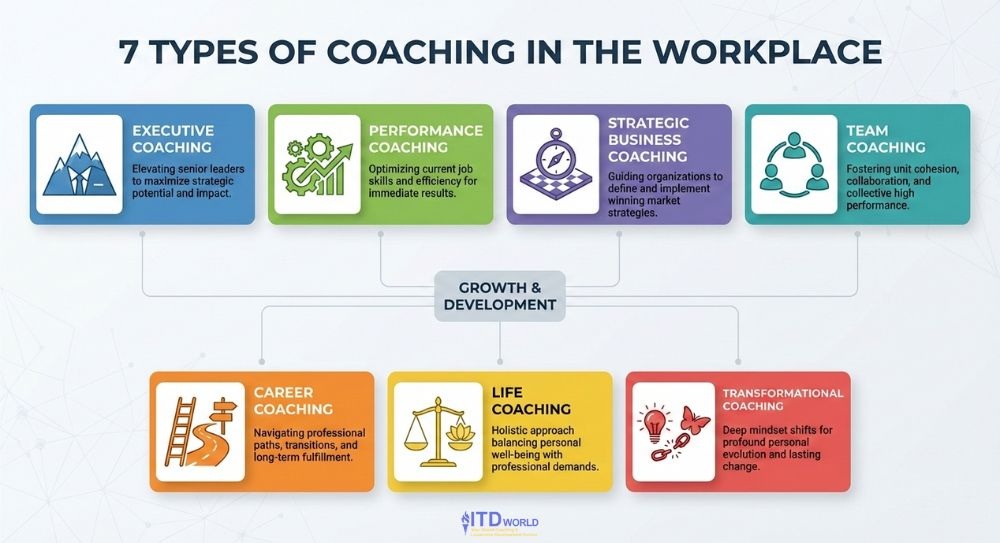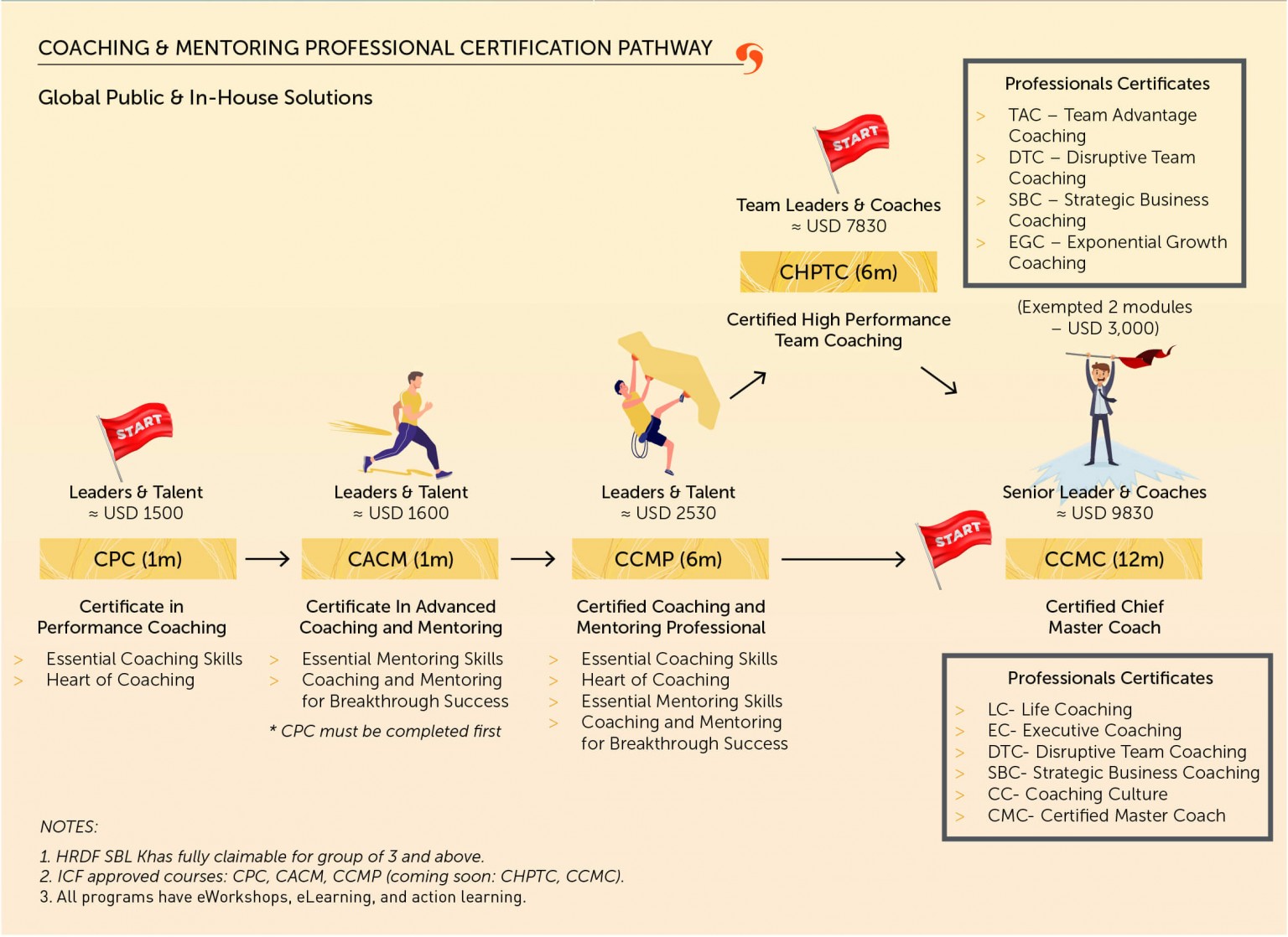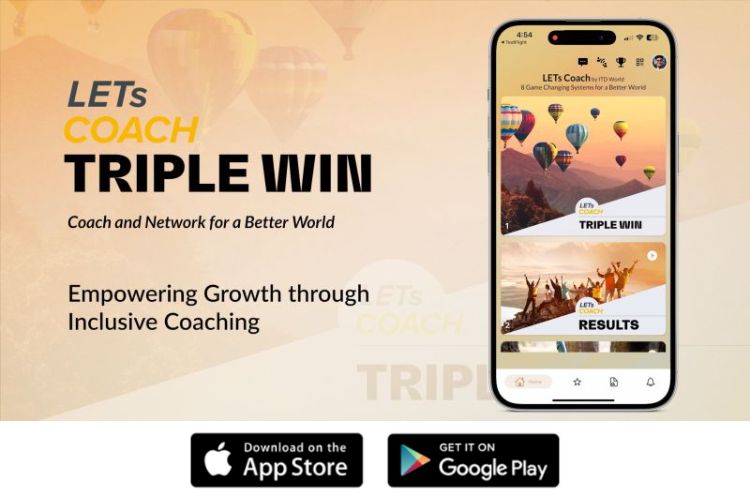In today’s dynamic workplace, coaching is no longer a luxury; it has become a critical tool for unlocking potential and driving organizational success. This article explores 7 essential types of coaching in the workplace – from executive to transformational – so that one may better understand each type’s unique purpose, target audience, and ideal scenarios to strategically implement.
|
Author: Jonathan M. Pham |
Highlights
- Coaching at work is essential for fostering strong relationships, unlocking individual potential, and achieving tangible business results through the cultivation of a culture of growth, collaboration, and high performance.
- There are 7 key types of coaching in the workplace: executive, performance, strategic business, life, team, career, and transformational, each targeting distinct areas of professional and personal development.
- Selecting the appropriate types of coaching hinges on aligning the coaching’s focus, target audience, desired outcomes, and organizational context to ensure it effectively addresses specific needs and maximizes impact.
Why is Coaching in the Workplace Important?
The business landscape has been rapidly evolving and becoming increasingly competitive. Simply managing employees is, therefore, no longer enough. Organizations need to cultivate environments where individuals and teams thrive, innovate, and consistently perform at their peak. This is where coaching emerges – not just as a beneficial practice, but as a critical strategic imperative.
- Forging stronger interpersonal relationships
By creating dedicated spaces for open dialogue, active listening, and constructive feedback, coaching cultivates trust and psychological safety in the workplace – which, in turn, directly fuels collaboration. When individuals feel heard, understood, and supported, they are more likely to share ideas freely, engage in productive conflict resolution, and work cohesively towards common objectives.
Research from organizations like Gallup consistently demonstrates that strong workplace relationships are a key driver of employee engagement and productivity, with teams exhibiting high levels of trust and collaboration significantly outperforming those that lack these elements.
- Unlocking individual potential
Coaching goes beyond traditional training programs by offering personalized development pathways. Through coaching conversations, employees gain a deeper understanding of their strengths and areas for development, explore new skillsets relevant to their roles and career aspirations, and learn to leverage their unique talents effectively. The process of setting achievable, yet challenging, goals in partnership with a coach empowers individuals with a sense of ownership and agency over their professional growth.
Studies show that those who receive coaching typically demonstrate increased self-awareness, higher levels of motivation, and improved performance outcomes. For instance, the International Coaching Federation (ICF) has reported that companies using coaching have seen a median return of 7 times their investment.
- Achieving tangible business results
Rather than a mere “nice-to-have” perk, coaching is a vital engine for driving sustainable success. It improves communication flow both upwards and downwards within the hierarchy, ensuring clarity of expectations and fostering a more open and transparent work environment. This, coupled with a workforce equipped with new skills and a growth mindset, directly nurtures a more efficient and positive work environment – where team members feel valued, invested in, and empowered to contribute their best work.
Companies with strong coaching cultures often report better performance metrics. For example, those like Google and Microsoft are known for their robust internal coaching programs and consistently rank high in employee satisfaction and innovation indices. Statistics show that organizations with strong learning cultures, often fostered by coaching, are significantly more adaptable, resilient, and profitable in the face of market disruptions.
The only thing worse than training your employees and having them leave is not training them and having them stay.
Henry Ford

7 Types of Coaching in the Workplace
-
Executive coaching
Often considered the cornerstone of workplace coaching, executive coaching (also called “leadership coaching”) is a focused development process designed to propel already successful leaders to even greater altitudes. It’s not about fixing problems, but about enabling executives to maximize their potential, achieve outstanding results, and significantly amplify their contribution to the organization and beyond.
Executive coaching is laser-targeted for those in senior leadership roles – from CEOs and directors to VPs and senior managers – who are ready to refine their leadership capabilities and, crucially, to translate organizational vision into actionable strategies and tangible goals. It serves as a powerful catalyst, encouraging leaders to delve deeper into their strengths, leverage past successes as springboards, and cultivate even greater achievements.
The coaching journey facilitates vital behavioral shifts, bridging the gap between current performance and aspirational expectations. By confronting and overcoming both internal limitations (like blind spots or ingrained habits) and external obstacles (such as organizational complexities or market disruptions), leaders emerge from the process invigorated and strategically positioned for sustained future growth and impact.
Best for:
- Whom:
- High-potential executives, senior managers, directors, VPs, and C-suite leaders including CEOs.
- Leaders transitioning into significantly larger or more complex roles.
- Scenario:
- Leaders seeking to enhance strategic thinking, decision-making, and execution capabilities.
- Those needing to refine their leadership style for greater impact and influence.
- Those facing significant organizational change, disruption, or increased competitive pressure.
- High-performing leaders seeking to maximize their potential and prepare for future advancement.
- Leaders aiming to overcome specific performance gaps or behavioral patterns hindering their effectiveness.
- Organizations investing in leadership development to drive strategic initiatives and achieve ambitious goals.
Read more: Leadership Feedback – Key to Changing for the Better
-
Performance coaching
Performance coaching is a targeted intervention centered on elevating an individual’s effectiveness and impact within their current organizational role. It’s a practical and results-oriented approach designed to optimize job performance by equipping individuals with new capabilities, clarifying expectations, and strategically dismantling barriers that impede their success. Rather than broad leadership development, it zeroes in on the “here and now,” empowering individuals to not just meet, but exceed, expectations in their day-to-day responsibilities.
At the heart of performance coaching is the acquisition of specific, job-relevant skills and the refinement of existing competencies. It actively addresses performance roadblocks, which could range from process inefficiencies or communication breakdowns to skill gaps or a lack of clarity regarding role expectations. Through structured goal-setting and supportive guidance, it facilitates a clear line of sight to professional aspirations within the context of their current position. This process cultivates a sense of ownership and empowers individuals to proactively visualize and then realize their potential in their present contributions to the organization.
Best for:
- Whom:
- Individual contributors, team members, specialists, front-line managers, and employees at all levels seeking to enhance their effectiveness and efficiency in their current roles.
- Individuals new to a role or facing specific performance challenges.
- Scenario:
- Improving productivity, efficiency, and output in current tasks and responsibilities.
- Onboarding new employees effectively and accelerating their time to peak performance.
- Addressing specific performance gaps or areas for improvement identified through reviews or feedback.
- Developing specific skills crucial for current job requirements (e.g., time management, communication, technical skills, sales techniques).
- Streamlining workflows, processes, and individual or team operations for greater effectiveness.
- Supporting employees taking on new responsibilities or projects within their existing roles.
Read more: Continuous Feedback – A Cornerstone of Modern Workplace

Types of coaching
-
Strategic business coaching
Strategic business coaching involves a dynamic partnership focused on guiding businesses to develop and decisively implement winning strategies. It’s not just about reacting to the market – but about proactively shaping a future of sustained profitability and competitive advantage. As such, it delves into the critical elements of organizational success, including in-depth market exploration, incisive competitive intelligence gathering, robust financial blueprinting, and innovative marketing approaches.
Strategic business coaching acts as a catalyst for companies to move beyond day-to-day operations and gain a clear, elevated perspective on their market landscape and internal capabilities. It facilitates a rigorous examination of the external environment – understanding market trends, identifying emerging opportunities, and anticipating competitive moves. Simultaneously, it supports an introspective analysis of the organization’s strengths, weaknesses, and resources. Through this dual lens, companies are better equipped to craft strategies that are not only ambitious – but also grounded in market realities and organizational capacity.
Best for:
- Whom:
- Business owners, entrepreneurs, leadership teams, strategic planning departments, business unit leaders, and organizations undergoing significant strategic shifts.
- Scenario:
- Businesses seeking to develop a new strategic direction or refine an existing one.
- Organizations facing rapid market changes, increased competition, or disruptive technologies.
- Startups and growing businesses needing to establish a solid strategic foundation for sustainable scaling.
- Businesses aiming to improve profitability, market share, or competitive positioning.
- Companies preparing for expansion into new markets or product/service lines.
- Organizations requiring a more data-driven and analytical approach to strategic decision-making.
-
Life coaching
Life coaching adopts a uniquely expansive perspective, embracing the interconnectedness of personal and professional growth to foster overall well-being. It involves a holistic partnership designed to guide individuals in achieving their aspirations across a broad spectrum of life domains – e.g. nurturing stronger relationships, optimizing physical and mental health, fostering personal evolution and self-discovery, and harmonizing the often-competing demands of work and personal life. Unlike coaching focused on specific professional skills or business strategies, life coaching delves into the very essence of an individual’s desired existence, enabling them to live a more deeply fulfilling, purpose-driven life.
Life coaching operates on the principle that personal and professional spheres are intrinsically linked; progress in one area often positively impacts others. It encourages individuals to define their own vision of a successful and meaningful life, then collaboratively develops strategies and action plans to bridge the gap between their current reality and that aspirational vision. This process may involve clarifying values, identifying limiting beliefs, building self-confidence, improving communication skills, or developing healthier habits.
Best for:
- Whom:
- Individuals from all walks of life seeking greater overall well-being, personal fulfillment, and life balance.
- Those at a crossroads, experiencing life transitions, or feeling a sense of dissatisfaction or lack of purpose.
- Scenario:
- Individuals seeking to improve relationships, communication, and interpersonal effectiveness.
- People aiming to enhance their physical and mental health, stress management, and self-care practices.
- Those desiring personal growth, self-discovery, and a deeper understanding of their values and purpose.
- Individuals striving for better work-life integration and reduced burnout.
- People navigating significant life transitions (career changes, relationship shifts, personal challenges).
- Anyone seeking to increase their overall life satisfaction, happiness, and sense of meaning.

Types of coaching
Read more: Self-coaching – A Practical Guide to Being Your Own Coach
-
Team coaching
Team coaching channels coaching expertise to an entire team unit simultaneously, forging a cohesive and high-performing collective. It’s a strategic approach that amplifies coaching impact through shared learning and the cultivation of a collaborative team dynamic. Beyond cost-efficiency, it inherently fosters a culture of mutual support, shared accountability, and collective growth.
With team coaching, participants actively learn not only from the coach, but crucially, from each other’s experiences, perspectives, and challenges. As such, it serves as a catalyst for enhancing teamwork skills – improving communication, strengthening trust, resolving conflicts constructively, and aligning individual efforts towards overarching shared objectives. By working through challenges and opportunities together under the guidance of a coach, teams cultivate a stronger sense of unity, shared purpose, and collective efficacy. Eventually, a group of individuals are transformed into a truly synergistic unit, capable of achieving goals that surpass what they could accomplish independently.
Best for:
- Whom:
- Intact teams, project teams, leadership teams, cross-functional teams, departments, and any defined group within an organization that needs to function as a cohesive unit to achieve shared objectives.
- Scenario:
- Teams struggling with communication breakdowns, conflict, or lack of trust.
- Newly formed teams needing to establish operating norms and build strong working relationships quickly.
- Teams aiming to improve collaboration, decision-making, and problem-solving capabilities.
- Teams tasked with complex projects or strategic initiatives requiring high levels of interdependence and coordination.
- Teams seeking to enhance their overall performance, productivity, and ability to achieve common goals.
- Organizations aiming to foster a broader coaching culture across multiple teams and departments.
Read more: Learning & Development – Asset for Long Term Growth
-
Career coaching
More than just finding a job, the core of career coaching is about strategically crafting a fulfilling and impactful professional path aligned with one’s intrinsic interests, core skills, and deeply held values. This form of coaching guides individuals through a process of self-discovery and exploration, equipping them to articulate clear career objectives and come up with actionable strategies to visualize them.
Career coaching delves into the essential elements of career fulfillment – identifying passions, recognizing inherent talents, and understanding personal motivators. It provides a structured framework for individuals to visualize their ideal professional future and then build a bridge from their current situation to that aspirational destination. This may involve strategic planning for seamless career transitions, proactively managing job changes, and effectively overcoming periods of unemployment or career uncertainty.
Best for:
- Whom:
- Individuals at any developmental stage – from students and recent graduates to experienced professionals and those considering retirement.
- Those contemplating a career change, facing job loss, or feeling stuck or unfulfilled in their current path.
- Scenario:
- Individuals seeking clarity and direction in their career path.
- People considering a career change or transition to a new industry or role.
- Individuals re-entering the workforce after a break or facing unemployment.
- Those wanting to enhance their career advancement prospects and earning potential.
- Individuals seeking greater job satisfaction, purpose, and alignment with their values in their work.
- People needing support in developing job search strategies, networking skills, and interview techniques.

Types of coaching
-
Transformational coaching
A deeply immersive process that ventures beneath the surface of behaviors and skills, transformational coaching delves into the foundational layers of one’s beliefs, ingrained assumptions, and automatic habits. Rather than incremental improvement, it’s about catalyzing profound and lasting shifts in mindset and behavior. This type of coaching directly challenges self-limiting thought patterns and actively cultivates a resilient growth mindset, paving the way for fundamental personal evolution.
At the heart of transformational coaching lies a commitment to radical self-awareness and profound self-discovery. It guides individuals on an introspective journey to uncover deeply held beliefs that may be unconsciously shaping their reality and limiting their potential. By bringing these often-invisible patterns into conscious awareness and respectfully challenging their validity, individuals are empowered to break free from old paradigms and embrace new, more expansive ways of thinking and being. In other words, they are equipped to fundamentally reshape their sense of self and realize aspirations that once felt out of reach.
Best for:
- Whom:
- Individuals seeking fundamental personal growth, a significant shift in perspective, or liberation from deeply ingrained patterns.
- Those feeling stuck, facing recurring life challenges, or yearning for a more authentic and purposeful existence.
- Scenario:
- Individuals experiencing a sense of dissatisfaction despite external success, indicating a deeper internal misalignment.
- People ready to confront and overcome deeply ingrained limiting beliefs or self-sabotaging habits.
- Those seeking a significant shift in perspective, values, or sense of self.
- Individuals navigating major life transitions or existential questions and seeking deeper meaning.
- People desiring to unlock their full potential and live more authentically in alignment with their true selves.
- Anyone ready for deep inner work and committed to profound and lasting personal change.

Choosing the Right Types of Coaching
The power of coaching lies in its adaptability. There isn’t a single “best” approach; rather, the most effective option is always the one that is precisely aligned with the specific needs and desired outcomes of the individual, team, or organization in question. Choosing the right types of coaching is therefore a critical first step, ensuring that resources are invested strategically and that the coaching engagement yields maximum impact.
To navigate this diverse spectrum, consider asking these guiding questions:
- What is the primary focus area for development? Is the need centered around:
- Leadership at the highest levels?
- Improving performance in current roles?
- Developing and executing business strategy?
- Enhancing overall well-being and life balance?
- Improving team dynamics and collective performance?
- Guiding career direction and professional fulfillment?
- Deep personal transformation and mindset shifts?
- Who is the coaching engagement intended for? Is it for:
- Individual executives or senior leaders?
- Individual contributors or front-line staff?
- Teams or departments?
- Business owners or strategic decision-makers?
- What are the desired outcomes and key objectives? Are you aiming to:
- Drive strategic organizational goals and enhance leadership effectiveness?
- Improve productivity, efficiency, and specific skill sets within current roles?
- Foster collaboration, communication, and team cohesion?
- Unlock personal potential, improve well-being, and find greater life purpose?
- Gain career clarity, navigate transitions, and achieve professional goals?
- Facilitate fundamental shifts in mindset, beliefs, and behaviors for lasting change?
- What is the organizational context and culture? Is the organization:
- Investing heavily in leadership development and strategic initiatives?
- Focused on performance metrics and efficiency?
- Valuing employee well-being and personal growth?
- Supporting individual career progression and talent management?
By thoughtfully considering these questions, organizations and individuals may make informed decisions about which types of coaching will best serve their unique needs. Often, an initial needs assessment or exploratory conversations with potential coaches specializing in different areas can further clarify the optimal path forward.
Check out ITD World’s professional coaching pathway here!
Types of coaching
Other resources you might be interested in:
- One-on-one Coaching: The Art of the Breakthrough
- 12 Leadership Coaching Topics to Drive Lasting Transformation
- 10 Characteristics of a Good Coach: Moving Beyond Techniques
- Coaching vs Mentoring: Define the Differences
- Employee Development Plan: Fueling Future Success
- Future Ready Organization: 11 Tips to Building One
Note: The content on this article is for informational purposes only and does not constitute professional advice. ITD World is not responsible for any actions taken based on the information provided here.



